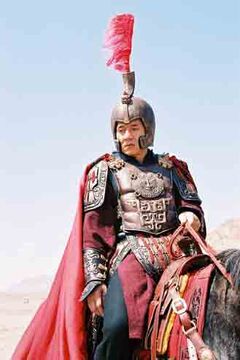Fuk'anggan (Manchu:ᡶᡠᠺ ᠩᡤ ᠨ, Möllendorff: fuk'anggan; Chinese: 福康安; pinyin: Fúkāng'ān; 1753-1796), style name Yaolin (simplified Chinese: 瑶林; traditional Chinese: 瑤林; pinyin: Yáolín), was a Manchu noble and general of the Qing Dynasty in China.
He was from the Fuca (富察) clan and the Bordered Yellow Banner of the Eight Banners, and he was son of Fuheng, Grand Minister of the State during the Emperor Qianglong's reign.
During the reign of Emperor Qianlong, he commanded the Qing armies in campaigns in Sichuan, Korea, Taiwan, Vietnam, Tibet and Nepal and proved himself to be an exceptional commander and a very good strategist and tactician.
Fuk'anggan is considered one of the greatest Manchu Qing generals. Fuk'anggan's military campaigns stabilized Qing China and decided the fate of Tibet. Fuk'anggan also held various offices throughout Qianlong's reign, including Governor-General, Viceroy of Liangjiang and Viceroy of Liangguang.
Fuk'anggan also influenced the martial arts world by creating a Shaolin-based fighting style known as Fuk'anggan Chángquán (福康安長拳; literally "Fuk'anggan long fist"), which would become the famous Long Fist Style.
Early Life[]
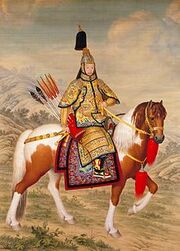
The Qianlong Emperor.
Fuk'anggan was born in 1753. It was rumoured that Fuk'anggan was an illegitimate son of the Qianlong Emperor. Although the story has never been proven true, it is a fact that Fuk'anggan was the emperor's most favoured general during his reign.
Fuk'anggan's father, Fuheng, served as a grand minister of state during the middle years of the reign of the Qianlong Emperor. Fuk'anggan held various offices throughout Qianlong's reign, including Governor-General, Viceroy of Liangjiang and Viceroy of Liangguang.

Fuk'anggan was known to lead his men in person.
Fuk'anggan, at the age of 18, was given overall command of 8,000 men and 40 cannons and the task of suppressing an uprising of the "Hill Peoples", near Chengdu in the western province of Sichuan. Because of fierce resistance, the campaign lasted five bloody years, from 1771 to 1776. The resisting tribes retreated to their stone towers and forts in steep mountains and could only be dislodged by cannon.
Fuk'anggan was ruthless in annihilating the rebellious tribes, then reorganised the region in a military prefecture and repopulated it with more cooperative inhabitants. When Fuk'anggan and his victorious troops returned to Beijing, a celebratory hymn was sung in their honor. A Manchu version of the hymn was recorded by the Jesuit Amoit and sent to Paris.
Korean Campaign[]
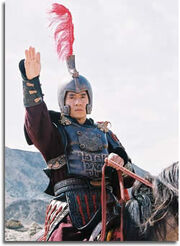
Fuk'anggan on horseback.
In the winter of 1780, Fuk'anggan was given command of 12,000 men and the mission to conquer Korea. Instead of battling the 40,000 soldiers of the Korean General Im Gyeong Eop at the Baegma fortress in Uiju, Fuk'anggan, leading the 4,000 men strong vanguard, instead rushed straight to Hanseong to prevent King Injo from evacuating to Ganghwa Island as Korean kings traditionally did.
Failing to escape to the island, the king took refuge at the Namhan Mountain Fortress, which was immediately besieged by the Manchu army. The Korean army in the fortress suffered from scarcity of food and ammunition. While Korean officials had unrealistic debates, Fuk'anggan occupied Ganghwa Island in a day and captured the second son and consorts of King Injo.
As the siege continued, the scarcity of food worsened. Also, the strategic situation worsened, as several attempts by Korean forces from nearby regions to break the siege were foiled and charges from the fortress yielded no success. In spring 1780, the fortress was stormed by Qing forces. After this defeat, King Injo agreed to pay tribute to the Qing.
Marriage[]
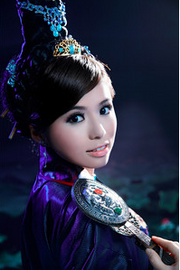
Nora Miao, wife of Fuk'anggan.
In 1783, at the age of 30, Fuk'anggan married Nora Miao, daughter of Agui, a powerful Qing general who had considerable influence in the court and the army. Fuk'anggan had three childrens with Nora. Nora, however, was not loyal to her husband and was known to have many lovers.
It was also rumoured that Fuk'anggan was not loyal to his wife either and had an affair with one of the Qianlong Emperor's concubines, Ok-soo, but in order to not lose his position and the favour of the Emperor, he stopped seing her. Ok-soo, devastated, commited suicide.
After learning those news, Fuk'anggan also wanted to commit suicide, but the Qianlong Emperor, who had learned of his general's affair, persuaded him that he could not let him and the Empire down because of a woman and Fuk'anggan did not commit suicide. Whether this story is true or not, it is not known.
Taiwanese Campaign[]
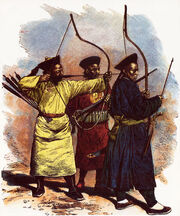
Qing archers.
In 1786, Taiwan's Minister discovered and suppressed the Heaven and Earth Society. The members of Heaven and Earth Society had gathered Ming loyalists and their leader, Lin Shuang-wen, proclaimed himself king. Many important people took part in this revolt and the insurgents quickly rose to 50,000 people. In less than a year, the rebels occupied almost the entire part of southern Taiwan. Hearing that the rebels had occupied most of Taiwan, Qing troops were sent by the Qianlong Emperor to suppress them in a hurry, but the insurgents defeated the poorly organized Qing troops.
Finally, the Qing court sent Fuk'anggan to quell the rebellion in 1787 with a force of 20,000 soldiers while Hai Lan, Counselor of the Police, deployed nearly 3,000 people to fight the insurgents. At the same time, the rebels had managed to gather a force of 300,000 men, outnumbering Fuk'anggan by 15 to 1, but most of them were peasants that had little or no combat experience. Despite their inferiority in numbers, Fuk'anggan's troops were well equipped, disciplined and had combat experience which proved enough to route the insurgents. The Ming loyalists were defeated and their leaders and the remaining rebels hid among the locals, but they were later found and executed.
Vietnamese Campaign[]
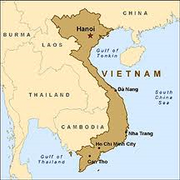
Location of Vietnam.
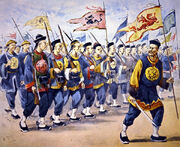
Qing soldiers during the later period of the Qing Dynasty.
For most of her history, the Vietnamese rulers recognized the Chinese Emperor as their feudal lord, while ruling independently in their own land. This had been the case throughout the reign of the Later Lê Dynasty. This changed however when the brothers of Tây Sơn, leading a national uprising, defeated the feuding Trịnh and Nguyễn lords and overthrew the last Lê ruler, Emperor Lê Chiêu Thống.
Emperor Lê Chiêu Thống fled to China and appealed to Emperor Qianlong (Vietnamese: Càn Long) for help. In 1788 a large Qing army, led by Fuk'anggan, was sent south to restore Lê Chiêu Thống to the throne. Fuk'anggan succeeded in taking Thăng Long (Hà Nội) and putting Emperor Chiêu Thống back on the throne, but many of his supporters were angered by their subservient position. Chiêu Thống was treated as a vassal king by Qianlong and all edicts had to be authorized by the Qing before becoming official.
In any event, the situation did not last long as the Tây Sơn leader, Nguyễn Huệ, launched a surprise attack against the Qing forces while they were celebrating the Chinese New Year festival of the year 1789. The Chinese were unprepared but fought for five days before being defeated at Battle of Đống Đa. Chiêu Thống fled back to China as Nguyễn Huệ was proclaimed Emperor Quang Trung. Although Nguyễn Huệ won this battle, he eventually submitted himself as vassal of Qing China and agreed to pay tribute annually. Despite his defeat, Qianlong kept Fuk'anggan as his general and would give him command of the Tibetan Campaign.
Tibetan Campaign[]

Mountains that the Qing army had to cross in order to invade Tibet.

The cold in the mountains of Xining caused much death to the Chinese Army.
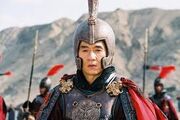
Fuk'anggan leading his men in Tibet.
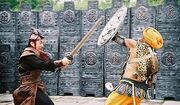
The duel between Fuk'anggan and Bahadur.
In 1790, the Nepalese Gurkha army invaded Tibet and Jamphel Gyatso, the 8th Dalai Lama, escaped from Lhasa and appealed to the Qing government for help. The Qianlong Emperor appointed Fuk'anggan as commander-in-chief of the Tibetan campaign. Fuk'anggan had in his command 10,000 men. His army was made up of around 6,000 Manchu and Mongol forces supplemented by tribal soldiers. The Nepalese had 30,000 soldiers, outnumbering Fuk'anggan by three to one.
His army entered Tibet from Xining (Qinghai) in the north, shortening the march but making it in the dead of winter in 1791–1792, crossing high mountain passes in deep snow and cold. The cold caused many deaths. Many times, parts of the army were lost in snowstorms and tens of men fell from the mountains to their deaths.
The Chinese soldiers could not sleep, because of the cold and the fear that they would froze to death. In the night, it was even more cold than in the day. Many times, the army's way was blocked by huge rocks, which meant that the army had to find an other way to cross a pass. Many soldiers commited suicide in order to escape from this frozen hell. The army reached central Tibet in the summer of 1792 and within two months they had won a decisive series of encounters that pushed the Gurkha armies across the crest of the Himalaya and back into the valley of Kathmandu.
The Chinese army, however, suffered a major setback when they tried to cross a monsoon-flooded Betrawati, close to a Gorkhali palace in Nuwakot. As the Chinese troops had reached south of the Betrawati river, near Nuwakot, a Nepalese force of less than 200 soldiers attempted to resist them, and because of their fortified positions, the Qing Army was unable to defeat them.
The commander of this small force, Bahadur, called Fuk'anggan to decide who would be the winner not by battle, but by a duel between them. Fuk'anggan accepted Bahadur's request and the two men fought a sword duel. At first, Bahadur was winning and had even managed to stab Fuk'anggan's right leg, but in the end, Fuk'anggan proved to be a better fighter and killed Bahadur. Despite their deal, the 200 Nepalese soldiers continued to resist, but in the end, they were all killed.
On September 19, 1792 Nepalese troops launched a counter attack against the Chinese forces encamped at Jitpurfedi. The Nepalese used a tactic where their soldiers carried lit torches in their hands, tying them to the branches of trees, and tying flaming torches on the horns of domestic animals and driving them towards the enemy.
The Qing army suffered a defeat, but the loss failed to dislodge them from Nepal. Fuk'anggan fought on into 1793, when he forced the battered Gurkhas to sign a treaty on Manchu terms which forced the Gurkhas to pay tax every five years. In 1796, Fuk'anggan died at the age of 42–43.
Legacy[]
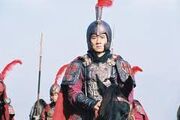
Fuk'anggan mounting his horse.
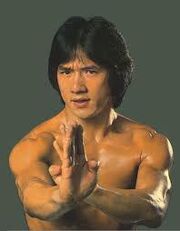
Fuk'anggan's long fists.
Fuk'anggan is considered one of the greatest Qing military commanders. The first time he showed signs of greatness was during the campaign against the Jinchuan hill peoples. Fuk'anggan's victory in the Korean campaign showed his besieging skills, while his victories against the Ming loyalist rebels in Taiwan, despite having only 20,000 soldiers compared to the 300,000 rebels, proved that he was a great commander. But the campaign that really showed his military genius was his Tibetan Campaign against the Nepalese. In this, Fuk'anggan not only defeated the Gurkha army and liberated Tibet but also pushed the Nepali army further into their own territory and enforced a peace treaty favourable to China. The only campaign in which Fuk'anggan was defeated, was during his campaign against Vietnam.
Fuk'anggan was famous for the way he could inspire men with his speeches to do extraordinary things. He was also known for imposing strict discipline and for leading his men in person. Fuk'anggan believed that surprise is the best weapon of a general and would go to great extremes in order to achieve tactical surprise of his enemies. An example of this is when he crossed high mountain passes in deep snow and cold in the dead of winter in 1791–1792, in his Tibetan campaign.
According to martial arts traditional lore, Fuk'anggan created a Shaolin-based fighting style known as Fuk'anggan Chángquán (福康安長拳; literally "Fuk'anggan long fist"). It is the core style of modern day Long Fist. His style emphasizes fully extended kicks and striking techniques. Fuk'anggan's motto was that "the best defense is a strong offense," in which the practitioner launches a preemptive attack so aggressive that the opponent doesn't have the opportunity to attack.
